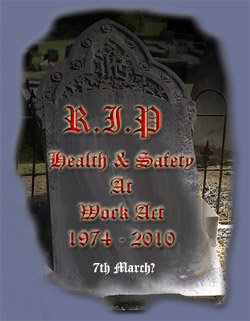 |
 |
|
The CWU has issued it's most detailed letter to branches yet into the threat that the general election poses to the health, safety and welfare of working people in the United Kingdom. In the opening paragraph of LTB352/10, entitled, Health And Safety Regulation And Enforcement Activity "Fact Sheet" - A General Election Issue; Dave Joyce, the Union's National Health, Safety & Environment Officer warns that:
Making it clear that workplace health and safety is an election issues, he continued by reminding us of what a Conservative government on 7th May will mean for all the working people of this country: Dave makes the point that, "Regardless of the result of the election there is likely to be pressure for both cuts in regulation and enforcement activity as a result of the plans to address the national debt and concentrate on economic recovery." Commenting factually on the various political parties stance on protecting the workplace from preventable injuries and deaths, Dave explains: "Following Labour’s election victory in 1997, the Labour Government implemented their manifesto commitment on increased HSE funding and there followed a renewed impetus for health and safety enforcement. Between 1997 and 2000, HSE prosecutions rose by 20%. Since then, however, HSE enforcement activities have declined markedly, not least within the context of the Government’s rolling out of the Hampton Report recommendations to withdraw from unnecessary regulatory oversight. From 2000 to 2009 HSE prosecutions, prohibition notices issued and RIDDOR accident investigated fell significantly. The Liberal Democratic Party aren't clear about health and safety and have said little on the subject. They only state that they will reduce the burden of unnecessary red tape by properly assessing the cost and effectiveness of regulations before and after they are introduced, using 'sunset clauses' to ensure the need for a regulation is regularly reviewed, and working towards the principle of 'one in, one out' for new rules." But the most worrying aspects of the LTB refer to the intentions of the Tory party if elected to form the next government. Dave continues: "While there isn't anything positive for workplace health and safety activists in any of the manifestos, there is the series of Tory Policy Documents and Reports and the worrying definite commitment to reduce health and safety regulation in the Tory election manifesto. Given the Tory's persistent and corrupt year on year attacks on health and safety laws, including those in recent weeks, this must be an issue for those considering which way to vote in the forthcoming election."
" The Conservative Party have put themselves on the side of bad employers and have undermined the good employers who are happy to obey current legal minimum standards. The Tory Party Deregulation Plans as repulsive and although we do not get 100% of what we want from the current Labour government – the alternative is unimaginable for working people." The remainder of LTB352/10 contains a number of simple statistics that may help Union Safety Representatives argue the case against deregulation and argue for greater health and safety protection for workers. Do we have too much regulation? The HSE's Review of Health and Safety Regulation published in May 1994 stated that the HSE was responsible for 28 pieces of primary legislation and 367 sets of health and safety regulations. It also stated that the Commission's programme had led to the removal of 350 sets of regulations, replacing them with around 100 sets of modern regulations. The HSE website as at April 2009 lists 17 pieces of primary legislation and 231 statutory instruments owned and enforced by HSE/Local Authorities. This means we have 46% less regulation than 35 years ago and 37% less than just 15 years ago It is not just the number of regulations that have declined. Over the last three years the HSE has reduced the number of forms used for collecting information from business from 127 to 54 – a 57.5% reduction. Are businesses inspected too much? The number of premises that are covered by the HSE Field Operations Division is 884,000 covering 15 million workers. This means the average premises could expect a visit by an HSE inspector once every 38 years. Does business spend too much time on health and safety? CWU Demands for a New Government:
The letter to branches ends urging all of us to send out the following message to the Next UK Government: Source: CWU
|
 "It is important Workers do not let the next government risk lives at work and workers may well be voting for their long term safety standards! The Conservative Party have gone on record that they will CUT health and Safety. The HSE will undoubtedly face big cuts in an organisation already struggling with a lack of resources and Inspectors."
"It is important Workers do not let the next government risk lives at work and workers may well be voting for their long term safety standards! The Conservative Party have gone on record that they will CUT health and Safety. The HSE will undoubtedly face big cuts in an organisation already struggling with a lack of resources and Inspectors." Dave reminds us all that:
Dave reminds us all that: